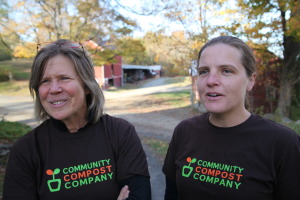As the farm-to-table movement flourishes in the Hudson Valley, entrepreneurs in New Paltz have launched a table-to-farm business that will make rich soil from food scraps collected from residential and commercial customers and composted on area farms. Their startup company will be nurtured by a new farming initiative designed to help a young generation of entrepreneurs succeed on the land.
Community Compost Co. is one of three enterprises accepted in the first class of the Hudson Valley Farm Business Incubator, launched this fall on a New Paltz farm by Glynwood, the agricultural nonprofit based in Cold Spring. The first of its kind in the Hudson Valley and part of a growing national trend in sustainable agribusiness, the incubator opened in October on a 323-acre farm owned by the Open Space Institute in the Mohonk Preserve Foothills.
Dave Llewellyn, director of farmer training at Glynwood, said the incubator will give startup farmers access to leased land, housing, shared farm equipment and infrastructure. Participants will be trained in business skills and branding, sustainable farming practices such as soil improvement and land planning and the practical skills needed for each participant”™s particular form of farming.

Llewellyn said the incubator is designed as a three-year program, though Glynwood will be flexible in length of stay for participants. He said Glynwood hopes to help entrepreneurs find farmland of their own about halfway through the three-year program.
“The OSI (Open Space Institute) has a lot of agricultural land and they are really interested in our graduates to lease their other land,” Llewellyn said.
Joining Community Compost Co. in the first incubator class are Ferdinand”™s Farm, a diversified farming operation founded by Lily Dougherty-Johnson that produces eggs, honey, culinary herbs and edible flowers, and Four Legs Farm, whose owner, Leanna Mulvihill, next spring will begin raising lambs and pigs at the farm incubator. She said she plans to sell shares of frozen meat to members of a Community Supported Agriculture vegetable program.
Dougherty-Johnson and Mulvihill live in a house on the farm during their time at the incubator.
Mulvihill, a former Glynwood livestock apprentice, said her startup costs next spring will be about $15,000 to buy 30 lambs and 24 pigs, fencing and other supplies. “I couldn”™t start my own business without having access to land and access to capital and the support system,” she said at an open house at the incubator.
After leaving the incubator, “I”™d like to stay in this area,” Mulvihill said. “This is where I”™m going to be building my customer base, in the mid-Hudson region.”
Llewellyn said Glynwood also will help entrepreneurs gain access to low-interest capital, which could include the use of online crowdfunding sources such as Barnraiser and Kiva Zip. The Open Space Institute has started a low-interest loan fund for the incubator, he said.
Another incubator pioneer, Noa Simons, is a partner at TianDi Growth Capital Co. Ltd., a Shanghai company that invests in new technologies from the U.S. and other countries to develop and commercialize in China. Simons recently sold the 14-acre farm she bought in New Paltz for a boarding stable business serving horse owners.
While on the farm she met Eileen Banyra, a municipal planning consultant and the founder of Community Compost Co., who was seeking compost sites on Simons”™ and other farms for her new food waste recycling business. The women became business partners.
Banyra and Simons are exploring a new model for commercial composting by partnering with farm owners to spread production among multiple farm sites. Farmers will be given a share of the compost produced on their farms and the on-site operations will be managed by Community Compost.
The company”™s first production partner is Four Winds Farm, an organic farm in Gardiner in southern Ulster County. While developing partnerships with other farms in the area, Community Compost plans to use the incubator site in New Paltz as its main production site. Ferdinand”™s Farm”™s pasture-raised chickens will feed on the incubator”™s compost pile.
Simons at the open house said the company is removing the capital cost of a large-scale compost production site ”“ about $250,000 on average nationally ”“ by using Glynwood”™s incubator and other farms as composting sites.
“A lot of farms don”™t make compost,” said Banyra. “They”™re busy farming. ”¦If you can spread it (compost production) out, you are really distributing the wealth.”
“A lot of permanent jobs are created because it”™s employee-intensive,” she said.
Banyra”™s planning clients in her more established business include the city of Hoboken, N.J., where this summer and fall she collected food scraps dropped off at a downtown farmers market by 40 to 50 Hoboken residents who pay Community Compost a monthly fee. Banyra said she aims to recruit supermarkets and other large commercial clients “to push down the price for residents.”
By early October, the startup company was collecting about 2 tons of food scraps weekly. Banyra said the principals had invested about $30,000 in the startup so far this year.
“It”™s been fun for me,” said Banyra, whose business model is a work in progress. “But it”™s hard.”















